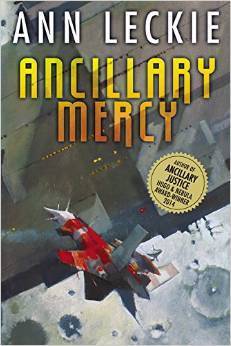In science fiction, few authors have captured the essence of identity, revolution, and the complexities of power dynamics as masterfully as Ann Leckie. Her Imperial Radch trilogy, consisting of "Ancillary Justice," "Ancillary Sword," and "Ancillary Mercy," stands as a testament to her narrative prowess and ability to craft intricate worlds that resonate with readers long after the final page.
In this blog post, we'll delve into the concluding instalment of the trilogy, "Ancillary Mercy," and examine how Leckie continues to explore themes of identity, agency, and societal change.
At the heart of "Ancillary Mercy" is the character of Breq, a former ancillary – a human body controlled by the artificial intelligence of a starship. Breq's journey throughout the trilogy involves self-discovery and rebellion against the oppressive Radch Empire. In "Ancillary Mercy," we witness Breq's continued struggle against the forces of imperialism and her quest for justice in a universe plagued by inequality and tyranny.
One of the most compelling aspects of Leckie's writing is her exploration of identity. Breq's existence as an ancillary blurs the lines between human and machine, raising questions about consciousness, autonomy, and the nature of the self. Throughout the trilogy, Breq grapples with her sense of identity, as well as the identities of those around her. Leckie challenges readers to consider what it truly means to be human in a world where bodies can be manipulated, and identities can be erased at the whim of those in power.
Central to the narrative of "Ancillary Mercy" is the revolution theme. As Breq works to overthrow the oppressive Radch regime, she is forced to confront the complexities of leading a rebellion and the moral dilemmas that come with it. Leckie skillfully navigates the grey areas of morality, portraying both the idealism and the harsh realities of revolutionary struggle. Breq's actions remind us that revolutions are messy, complicated affairs, often fraught with sacrifice and compromise.
Another notable aspect of "Ancillary Mercy" is Leckie's world-building. The universe she creates is richly detailed and immersive, populated by diverse cultures, species, and technologies. From the sprawling space stations of the Radch Empire to the remote outposts on the fringes of civilization, Leckie's world feels vibrant and alive, teeming with history and possibility.
In addition to its thematic depth and intricate world-building, "Ancillary Mercy" is also a masterclass in storytelling. Leckie's prose is elegant and evocative, drawing readers into the narrative with its lyrical beauty and emotional resonance. Her characters are fully realized and multi-dimensional, each with their hopes, fears, and motivations.
In conclusion, "Ancillary Mercy" is a triumph of science fiction literature, showcasing Ann Leckie's formidable talent as a writer and storyteller. Through its exploration of identity, revolution, and the complexities of power, the novel challenges readers to reconsider their assumptions about the world and their place within it. As Breq's journey comes to a close, we are left with a profound sense of awe and wonder at the limitless possibilities of the human spirit.

